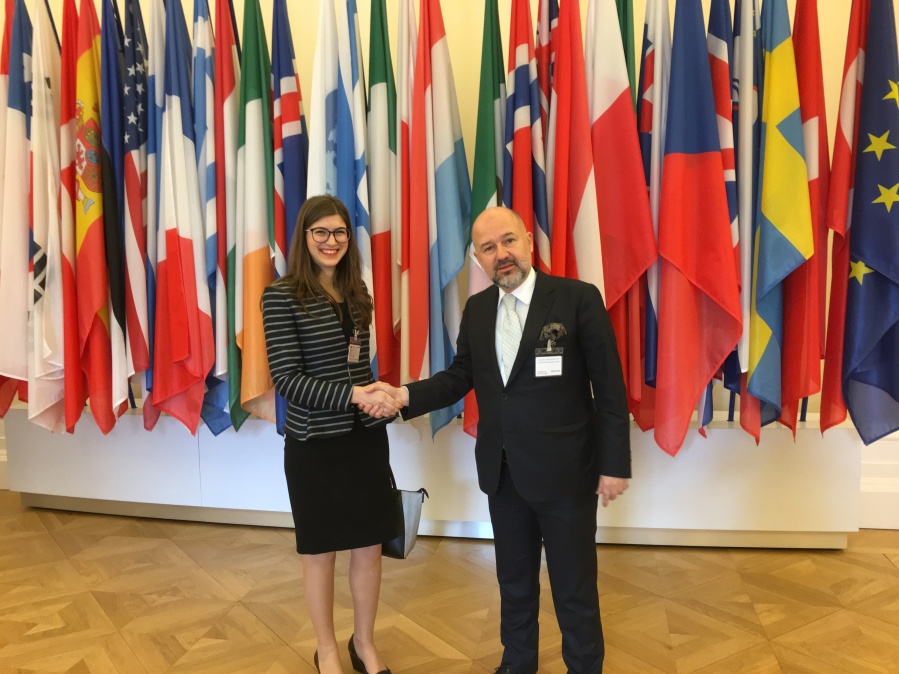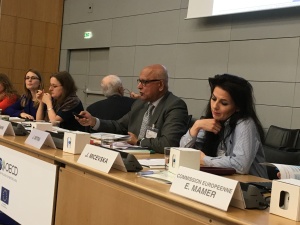 As an invited speaker at the recent Organisation for Economic Co-operation and Development (OECD) event, I had the opportunity to address the policymakers of the Balkans (in more recent terminology, South East Europe) on the 28th of April at the OECD Headquarters in Paris. I was invited to participate in a panel discussion at the launch of the SME Policy Index for the Western Balkans and Turkey 2016.
As an invited speaker at the recent Organisation for Economic Co-operation and Development (OECD) event, I had the opportunity to address the policymakers of the Balkans (in more recent terminology, South East Europe) on the 28th of April at the OECD Headquarters in Paris. I was invited to participate in a panel discussion at the launch of the SME Policy Index for the Western Balkans and Turkey 2016.
In my speech, I shared the Turkish experience of easing access to finance for entrepreneurs and SMEs. I believe Turkey has much to share with countries in the region since it is the only one to have passed an angel investment law and a co-investment law; a crowdfunding law is on the way.
The SME Policy Index is a benchmarking tool designed for emerging economies to assess SME policy frameworks and monitor progress in policy implementation over time. The Index was developed for the Western Balkans in 2006 by the OECD in partnership with the European Commission (EC), the European Bank for Reconstruction and Development (EBRD), and the European Training Foundation (ETF). The South East European Centre for Entrepreneurial Learning (SEECEL) joined as an additional partner in 2014. The SME Policy Index has since been applied in four regions and nine assessment rounds overall.
The SME Policy Index: Western Balkans and Turkey 2016 presents the results of the fourth assessment of the Small Business Act for Europe in the Western Balkans and, since 2012, Turkey. The assessment framework is structured around the ten principles of the Small Business Act for Europe (SBA). It provides a wide range of pro-enterprise measures to guide the design and implementation of SME policies, based on good practices promoted by the EU and the OECD.
The Index identifies strengths and weaknesses in policy design, implementation and monitoring. It allows for comparison across countries and measures the convergence of good practices and relevant policy standards. It aims to support governments in setting targets for SME policy development and to identify strategic priorities to further improve the business environment. It also helps to engage governments in policy dialogue and exchange good practices within the region and with OECD and EU members.
 The launch of the SME Policy Index: Western Balkans and Turkey 2016 was organised by the OECD South East Europe Regional Programme in co-operation with the European Commission, the European Bank for Reconstruction and Development (EBRD), the European Training Foundation (ETF) and the South East European Centre for Entrepreneurial Learning (SEECEL).
The launch of the SME Policy Index: Western Balkans and Turkey 2016 was organised by the OECD South East Europe Regional Programme in co-operation with the European Commission, the European Bank for Reconstruction and Development (EBRD), the European Training Foundation (ETF) and the South East European Centre for Entrepreneurial Learning (SEECEL).
The event represented a distinguished occasion to participate in a high-level discussion on SME policy in the EU enlargement region. The latest developments and outstanding challenges identified in the SBA assessment were debated with prominent EU officials, government officials from the Western Balkans, Turkey, and OECD member countries as well as international partner organisations. The event was structured as follows:
1) Interactive panel discussions on the most relevant policy areas for SMEs.
2) Sessions on innovation as an important driver of SME sector development, focusing on policies that foster links between business and education and between the public sector and social innovation.
3) The launch of the SME Policy Index: Western Balkans and Turkey 2016 – Assessing the Implementation of the Small Business Act for Europe, with the purpose of presenting the findings of the Small Business Act for Europe (SBA) Assessment and discussing key developments and remaining challenges for the business environment, particularly for SMEs in the EU enlargement region.
 My presentation included the following points:
My presentation included the following points:
- Turkey’s experience of easing SME access to finance in the early-stage investment market
- Supporting entrepreneurs and SMEs directly or supporting the supporters of entrepreneurs and SMEs
- How policymakers were convinced to change the mindset of supporting entrepreneurs and SMEs
- Converting public money to smart money
- Steps taken by different stakeholders of the early-stage investment market
- Treasury Department: Angel Investment Law – Co-investment Law – Crowdfunding Law
- Istanbul Stock Exchange: Private market for angels and start-ups
- TBAA – Turkish Business Angels Association: Capacity building training in cooperation with EBAN – Investment delegations to the Balkans – Creating awareness in the Balkans region – Recognising the success in the region: South East Europe Excellence Awards very year in Istanbul
- What could be the very first practical and realistic steps for angel investment in the Western Balkans, where angel investment is basically non-existent?
You can access the key messages and the full report at



